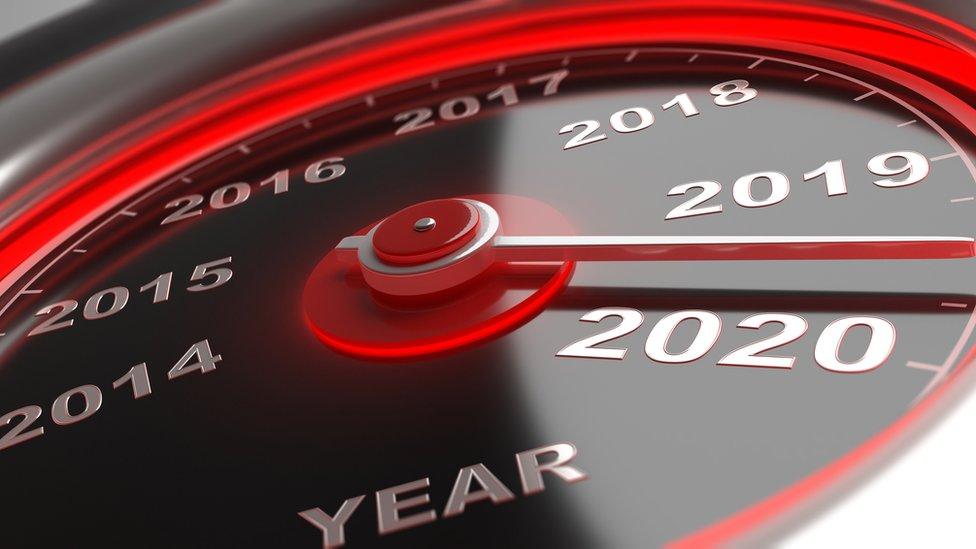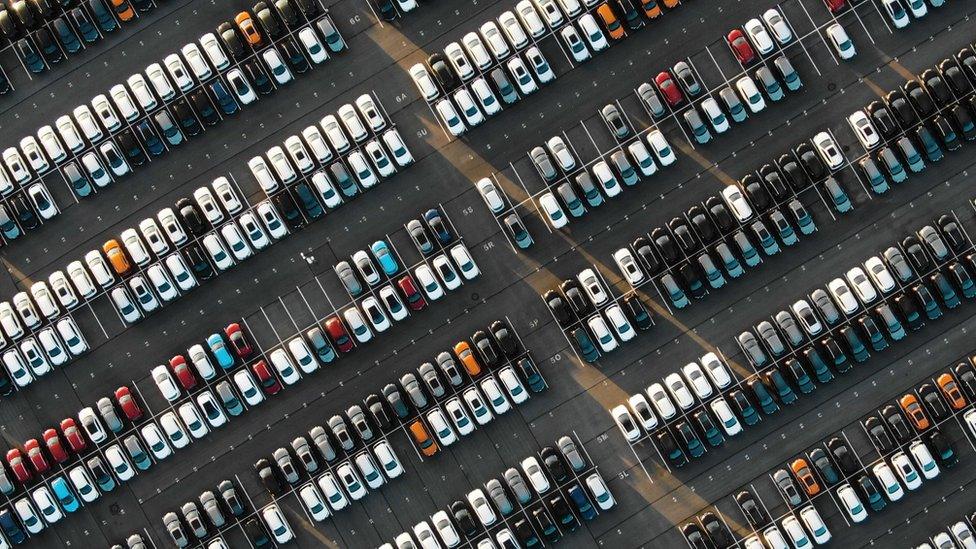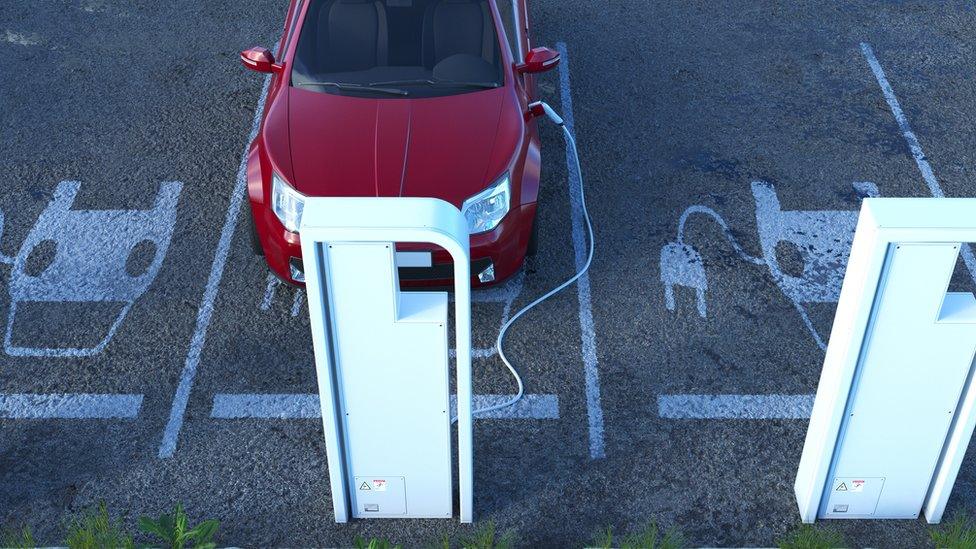The wheels are in danger of coming off the car industry
- Published

March sales of new cars plummeted on last year's numbers, at a time when the industry needs to be selling at its top cruising speed. With showrooms closed, it didn't stand a chance.
Seeing a way ahead for the market depends on many factors, including supply, demand, used car stocks, access to finance and handling the transition to electric cars.
Obscured by the health crisis, Brexit talks continue by video-conference, and Europe's car manufacturers warn of "catastrophe" if ministers' lack of attention to those negotiations lead it towards a no-deal exit
It shouldn't be any surprise that new car registrations plummeted last month.
As consumers lost confidence and pulled back on commitments to buy, and then as showrooms were forced to close, the number dropped by 44% across the UK, and by 49% in Scotland.
That was a drop of more than 200,000 cars compared with March 2019. In Scotland, the total nearly halved to 18,438.
If that seems a lot, it's because March should be a very busy month for sales. It's one of two months when new plates are introduced - in this case "20" - and that brings a peak. It's when dealers need to be very busy.
Small van sales were down by even more, dropping 53% since last year - arguably a more sensitive indicator of economic health.
And having previously estimated that the number of new registrations might almost hold steady this year, at 1.7m vehicles, the Society of Motor Manufacturers and Traders is estimating a full-year fall of 29% in 2020.
Plug-in
That follows on some bumper years. March 2017 saw more than twice as many UK registrations as last month. It's not an industry that invites sympathy, so long as it's allowed to get on with doing what it does very well.
But it was already facing a set of difficult challenges. While geared to around half the market being diesel, and with Britain a big manufacturer of diesel car engines, that segment of the market has fallen precipitously due to polluting particulates, emissions scandals and growing restrictions on big engines through tax and urban low emission zones.

March 2017 saw more than twice as many UK registrations as last month
The drop in new diesel registrations in March 2020 compared with March 2019 was 62%. That steep downward trend has been a feature of the market for years. Less than a fifth of new cars now are diesel.
The range of alternatively-fuelled cars is expanding fast, from a low base. Hybrid petrol cars saw a mild decline last month, while plug-ins and plug-in hybrid were the only categories on the rise. At nearly 12,000 across the UK, plug-in electric was close to reaching one in every 20 new cars last month, and that is expected to rise fast.
It's welcome in providing a greener future to the industry, but making the shift is a profound challenge to the industry to adjust, to get the right models to the market, and to have the right set of workshop skills to service them. And a pandemic in the midst of that is no help at all.
It has meant Europe's auto industry finding, first, a struggle with supply chain disruption from Chinese factories that had not reopened after New Year. Then they face disruption to their staffing, due to ill-health, followed by an enforced shutdown. And with unemployment expected to rise, possibly very sharply, that will mean less money available to buy big-ticket items.
Cash for clunkers
Will people turn to the used car market instead? That's not easy to say. That market has also tanked, also because forecourts are closed. And if they're not shifting, that stock is costing business a lot of money.
It's hard to price used cars until a number of factors become clearer in the new car market.
How fast can supply recover, given the supply chain of parts and components could remain disrupted. Manufacturers and dealerships will want to repair some badly damaged balance sheets. Dealers have stock they'll want to offload soon.
What will happen to demand, in the UK and in export markets? Spending patterns may change profoundly.
What happens to access to finance? Low interest rates help, and may be here to stay, but with extraordinary measures in monetary and fiscal policy, one can't be sure of anything.
To help stimulate the economy and help the sector in the last big crisis 11 years ago, Alistair Darling as Chancellor of the Exchequer poured public funds into a scrappage scheme - known in the US as "cash for clunkers". With lots of dirty old diesel engines on the road, this could be a way of reducing emissions and helping the industry.
But if it has a wish list for helpful government measures, it's more likely the car makers would choose a delay to Brexit and then a good deal to secure the least friction to trade.
'Catastrophic'
No, Brexit is not the top priority at the moment, but yes, it's still there, with negotiations curtailed to video-conferencing between UK and EU negotiating teams.
April 6th brought a strongly-worded document from the European Automobile Manufacturers Association (EAMA), pointing out that there's not much time left to strike a Brexit deal.

Sales of plug-in electric cars bucked the trend and continue to rise
Supply chains require one. And with battery technology, they are set to become more integrated. Britain does not have its own significant battery-making capacity. Its car makers need to import, and they want to do so without hindrance.
EAMA director general Erik-Mark Huitema says that, in a good year, €54bn of cars are traded between the EU and UK. Within that trade are €14bn worth of parts crossing the North Sea and English Channel.
"The clock is ticking for these complex negotiations, and we are very concerned that the time remaining under the transitional arrangement is insufficient, especially given the ongoing Covid-19 crisis," he warned.
"The unintended consequence of this could be a no-deal scenario. In terms of tariffs alone, this would have a massive impact, with some €6bn being added to the cost of doing cross-Channel trade.
"Such an outcome would be catastrophic to the automotive sector, and to the European economy in general. It should be avoided at all reasonable cost."
